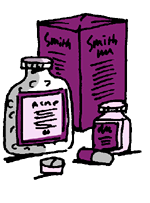
Be safe when using OTC drugs
There are hundreds of drugs sold over the counter today which required a physician's prescription less than 20 years ago. They help us take charge of our health, but we need to be cautious about what we're taking. That's when you need to rely on your pharmacist for more information.
Before using over-the-counter (OTC) drugs, here are some questions to ask your pharmacist:
1 Are there any unlisted side effects I should know about? Labels can't always list every possibility, so ask. Your pharmacist may also be able to tell you how to minimize the side effects.
2 Are there potential interactions with alcohol, food or other drugs? For example, some OTC medications can cause problems with blood pressure drugs.
3 Could the OTC drug complicate another medical problem I have (i.e. diabetes, prostate condition or heart or thyroid disease)?
4 When is the best time to take the drug?
5 Is there a less expensive version of the drug? Take charge.
Take charge. Carefully read OTC medicine labels for ingredients and proper use... Discard outdated drugs... Alert your physician or pharmacist if any new or unexpected symptoms appear... Keep a record of all your current medications and take this list to every visit with your provider.
Be sure to tell your provider if: You are allergic to any drugs or foods; have diabetes or kidney or liver disease; use alcohol or tobacco; take dietary supplements; are breast feeding or pregnant.
Blood Tests
What do they mean? W
When your doctor orders a blood test, ever wonder why it's needed or what it shows? Along with your medical history and physical exam, blood test results can help your provider diagnose or treat a specific condition. Listed below are some common blood tests and how they're typically used.
 Complete blood count -
Complete blood count - Measures several types of cells in your blood including:
- Red cells, which carry oxygen throughout your body.
- White cells, which are involved in allergies and fighting infection.
 Chemistry profile -
Chemistry profile - Checks a series of substances in your blood, which may include blood sugar, minerals, electrolytes, protein and uric acid; measures kidney and liver functions.
 Cholesterol -
Cholesterol - Checks for high total cholesterol or LDL (bad) cholesterol levels or low HDL (good) cholesterol, all of which are indicators of heart disease risk.
 Electrolytes -
Electrolytes - Checks for sodium, potassium, chloride and bicarbonate.
 Glucose -
Glucose - Measures your blood sugar level, which may be an indicator of diabetes risk.
 Kidney function -
Kidney function - Shows how active your kidney is in filtering wastes; a buildup of certain substances may indicate kidney problems.
 Liver function -
Liver function - Shows how well your liver is working; increased substances may indicate liver disease.
 Thyroid -
Thyroid - Diagnoses
hypo-(low) or
hyper- (high) thyroid conditions.
To learn more about your blood tests, be sure to ask your health care provider to explain the results and what they mean.
HEALTH CARE
 UPDATE UPDATE  |
 Many women ignore high blood pressure - three of every four women know they have it but fewer than one in three control it, according to the Alliance for Aging Research. Steps to control high blood pressure include losing excess weight, exercising more, having no more than one alcoholic drink a day, and taking prescribed medication for hypertension as directed. Johns Hopkins Medical Letter/Health After 50, 4.98 Many women ignore high blood pressure - three of every four women know they have it but fewer than one in three control it, according to the Alliance for Aging Research. Steps to control high blood pressure include losing excess weight, exercising more, having no more than one alcoholic drink a day, and taking prescribed medication for hypertension as directed. Johns Hopkins Medical Letter/Health After 50, 4.98
 The incidence of some cancers in the U.S. is declining. These include colorectal cancer, stomach cancer, Hodgkins disease, and cancers of the cervix, uterus, ovaries and mouth. However, the incidence of lung, breast and prostate cancer is rising. Most of the rise in breast and prostate cancer is due to greater public awareness and to improved and more frequent screening, which detects more tumors and sooner than before. The incidence of some cancers in the U.S. is declining. These include colorectal cancer, stomach cancer, Hodgkins disease, and cancers of the cervix, uterus, ovaries and mouth. However, the incidence of lung, breast and prostate cancer is rising. Most of the rise in breast and prostate cancer is due to greater public awareness and to improved and more frequent screening, which detects more tumors and sooner than before. |
 Asthma keeping you from exercise? Many people who suffer asthma attacks avoid physical activity for fear of their symptoms. There are new drugs available in either pill or inhalant form that may help you prevent exercise-induced wheezing. Check with your physician. Time 7/27/98 Asthma keeping you from exercise? Many people who suffer asthma attacks avoid physical activity for fear of their symptoms. There are new drugs available in either pill or inhalant form that may help you prevent exercise-induced wheezing. Check with your physician. Time 7/27/98 |

 Take charge. Carefully read OTC medicine labels for ingredients and proper use... Discard outdated drugs... Alert your physician or pharmacist if any new or unexpected symptoms appear... Keep a record of all your current medications and take this list to every visit with your provider.
Be sure to tell your provider if: You are allergic to any drugs or foods; have diabetes or kidney or liver disease; use alcohol or tobacco; take dietary supplements; are breast feeding or pregnant.
Blood Tests
What do they mean?
Take charge. Carefully read OTC medicine labels for ingredients and proper use... Discard outdated drugs... Alert your physician or pharmacist if any new or unexpected symptoms appear... Keep a record of all your current medications and take this list to every visit with your provider.
Be sure to tell your provider if: You are allergic to any drugs or foods; have diabetes or kidney or liver disease; use alcohol or tobacco; take dietary supplements; are breast feeding or pregnant.
Blood Tests
What do they mean? When your doctor orders a blood test, ever wonder why it's needed or what it shows? Along with your medical history and physical exam, blood test results can help your provider diagnose or treat a specific condition. Listed below are some common blood tests and how they're typically used.
When your doctor orders a blood test, ever wonder why it's needed or what it shows? Along with your medical history and physical exam, blood test results can help your provider diagnose or treat a specific condition. Listed below are some common blood tests and how they're typically used.
